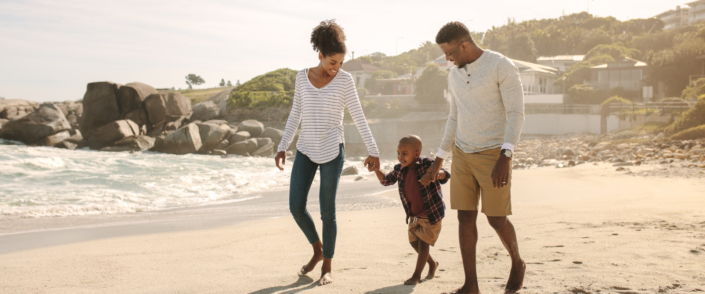Holiday time is important, so that you and your family get to spend quality time together. Whether you are going away on holiday or staying at home, here are our 10 Summer Safety Tips to keeping the family safe.
Make sure you have a fully stocked First Aid Kit
Make sure your first aid kit is fully stocked. This is a must, especially if you’re camping or on a family holiday! Ambulances can sometimes take longer to arrive in far outlying areas, and if you’re holidaying somewhere remote, it may be challenging to access health care. For this reason, we recommend you purchase a first aid kit, we have a Family First Aid Kit you can purchase from us and get couriered to your home (only in South Africa.) the kit comes with a booklet that explains how and when to use the items.
Be wary of this potential hazard from your garden hose this summer
Water inside a hose can reach temperatures of 60°C when left sitting in extreme heat. WARNING: Graphic image below. The summer sun is strong, so if you have water sitting stagnant in your hose, its temperature will be rising. Once you activate the trigger, boiling water has the potential to shoot out and cause severe burns.
An example from that has made international headlines after a mother filled her child’s pool, unaware of the scalding water being poured inside. The young boy was left with second-degree burns to 30 per cent of his body.
Evacuate any of that water that’s been left in the hose before you use it for any recreational purpose, especially if you will be playing with children in the backyard or you plan on giving your dog a bath. From time to time, homeowners leave their hoses out. Perhaps set up for convenience for the next time they are going to be using it in their yards. Of course, if they are left out in the sun for hours and hours at a time, any of the water that is left inside could be heated to an unsafe temperature.
Any water that may be in that hose could present a scald hazard if it’s not evacuated. Fortunately, it is a low-occurrence event but it is something to keep in mind this summer.
Children left in hot cars
On average, 38 children die each year from heat-related deaths after being trapped inside motor vehicles. Even the best of parents or caregivers can unknowingly leave a sleeping baby in a car and the end result can be injury or even death.
It is important to remember to use precaution with your kids and pets in hot cars every day, especially South Africa, where there can be mild to hot temperatures year round.
- The temperature in your car can rise 20 degrees within the first 10 minutes.
- Children overheat four times faster than adults.
- Remember your pets too! Every year hundreds of pets die from heat exhaustion because they are left in parked vehicles.
What happens when a child is left in a hot car?
- In a matter of MINUTES, they will experience heat exhaustion or heat stroke, leading to permanent disability or death.
- Heat stroke, also known as hyperthermia, can cause:
- Shock
- Seizures
- Irregular heartbeat
- Heart attack
- Damage to the brain, liver and kidneys
Here are some safety tips to keep in mind that we hope will help do away with any and all of these potential situations:
- DON’T FORGET TO CHECK THE BACKSEAT! Put something back there that you will need like your purse or briefcase, maybe one of your shoes, or better yet – your cell phone!
- Also try placing something in the front seat to remind you that your child is in the car, such as one of the child’s shoes or a stuffed animal.
- To avoid the situation of your kids getting in your car without you knowing, always lock your car and ensure children do not have access to the keys or remote entry devices. Children should be taught that cars are not a place for play.
- Hopefully by remembering to follow these important safety tips, together, we can prevent any of these unnecessary tragedies from happening.
Dangers of Dehydration
As the weather heats up, little ones are more prone to dehydration. Dehydration occurs when there isn’t enough fluid to maintain normal bodily functions. The body needs water to help maintain body temperature, make bodily fluids and for day-to-day functioning.
Young children and babies are at greater risk of becoming dehydrated than adults. Keeping your child hydrated is important at all times, but especially when they are unwell.
If your child is very thirsty, they are probably already dehydrated. The effects of severe dehydration can be serious.
Children with severe dehydration might:
- urinate less often
- urine is dark in colour and has a strong smell
- look pale
- be tired, lethargic or irritable
- have fewer tears
- be thirsty
- have sunken and dark eyes
- have a coated and dry tongue and mouth.
- You know your child best, so trust your instincts if your child doesn’t seem well.
Signs that your child has a serious illness that needs urgent medical attention include:
- severe pain,
- drowsiness
- pale or blue skin
- dehydration
- troubled breathing
- seizures
- reduced responsiveness
Care at home for mild dehydration
- The best treatment for mild dehydration is to give your child more fluid to drink, such as water or oral rehydration solutions. Do not give drinks that are high in sugar (e.g. flat lemonade or sports drinks), because they can make dehydration worse. If the child is vomiting, give small amounts slowly, otherwise they will vomit it up again.
Drowning prevention
Children under the age of 15 years old account for 30.2% of all fatal drownings in the country, while the highest mortality rate occurring in children under the age of 5 years old.
The fatal drowning burden in SA is approximately 3 every 100 000 people. But is increasing as a portion of all non-natural deaths.
Did you know that there is no age that is considered safe for anyone to swim unsupervised or alone? Fact: young children can drown in 6cm of water in less than a minute! What about the fact that drowning occurs in swimming pools only 52% of the time? And only 16% occurs in baths or spas? As for the remaining 32%?
The remaining 32% of drowning occurs in drowning hazards you probably haven’t considered, such as:
- Pet water bowls
- Bathtubs
- Toilets
- Buckets
- Fishponds
- Swimming pools
- Ditches filled with water
- The sea
- Dams
- Drains
CONSTANT ADULT SUPERVISION REMAINS THE MOST IMPORTANT IN PREVENTING DROWNING!
- Give them your undivided attention. Avoid any distractions while supervising children in or around water.
- Always be on the lookout for possible dangers. Inspect your home, vacation accommodation and when visiting other homes for possible water hazards.
- Children should be trained in water survival skills – floating and treading water without buoyancy aid in everyday clothing from as young as 6 months old. Swimming lessons can then follow.
- Swimming pools must be properly fenced off and have a childproof lock on the gate. The gate must never be left open.
- Add a professionally installed approved pool safety net to cover your pool. Jacuzzis and spa’s need to be covered when not in use.
- Everybody in your home and care givers should be trained in save rescue skills, first aid, especially CPR.
Car Safety
In 2020, children made up a staggering 34% of all fatalities caused by road accidents, up from 31% the previous year. In human terms, this meant that 672 children in the age group of 0-9 years died while being passengers in vehicles.
Collisions are the leading cause of death and injuries for children under the age of 14, according to the Road Traffic Management Corporation.
It’s important that children have the right car seats for their size and age. This is an easy way to reduce dramatically the sky-high child mortality rates in South Africa. We urge all parents to make sure their children are restrained when in vehicles.
Wheel Well, a non-profit organisation dedicated to road safety for children in South Africa, is urging South Africans to take road safety for children more seriously. Peggie Mars, Founder of Wheel Well, says that child deaths in road accidents declined again in 2021, which proves that activism really does work.
Wheel Well in partnership with Supa Quick are helping raise awareness around the importance of child car seats. If you have a pre-loved car seat you no longer use, why not make a generous donation and drop it off at a Supa Quick near you. A family in need will appreciate it and a needy child will benefit greatly. Make a difference today.
Fire Safety around the braai
(This article is from Burnshield’s Blog on their website) We recommend having Burnshield in the home, we are not sponsored for this, we endorse Burnshield because it works!
It’s no secret that South Africans enjoy a lekker braai. (Braai [br-eye] is a widely used noun and verb for an outdoor ‘barbecue’ where meat is cooked over a fire or coals). This delectable and enjoyable experience may not be in the kitchen but this cooking method still needs some burn awareness as it also comes with some burning issues. All Braai Masters should understand how to switch off fuel supplies, quench or smother blazes and call the fire department as the risks and hazards of braaing should not be underestimated.
As you are working with an open flame, make sure you have close to hand something to douse blazes in flare-ups and to control minor flames when the food catch alight like a squirt bottle of cold water. Never ever leave a lit braai unattended. Ideally keep a bucket of sand, or a fire extinguisher nearby if things really get out of hand.
We hope you enjoy those braais safely with our handy burn safety tips. Always remember to always have Burnshield nearby, as it’s most effective in the initial emergency phase.
Sun Safety
It is important to begin prevention measures in childhood because just one blistering sunburn before the age of 18 more than doubles kids’ chances of developing melanoma in adulthood. Melanoma is the most serious form of skin cancer and can develop anywhere on the body.
Sunscreen, when applied correctly, is one of the most effective tools to help protect their skin. But it isn’t the only one, and should be combined with other sun-safety methods.
APPLY SUNSCREEN
- Rub on 20 minutes before going outside.
- Use UVA and UVB broad-spectrum sunscreen with SPF 30 or greater (these filter out 97% of sun’s UVB rays).
- Look for sunscreens with zinc oxide +/- titanium dioxide and as high a zinc level as possible, as they tend to be less irritating.
- Use water resistant sunscreen if your child will be swimming, sweating, or playing in the water.
- Reapply (including water resistant sunscreens) every two hours, even on cloudy days. This is especially important when swimming or sweating.
- COVER THEIR SKIN WITH CLOTHING
- Try sun protective clothing with UPF 50 (sunprecautions.com and llbean.com are examples) or lightweight, long-sleeved pants or shirts with a tight weave.
- Wear a hat with a 3-inch brim to cover head, ears and neck.
LIMIT DIRECT EXPOSURE TO SUNLIGHT
- Avoid direct sunlight between 10 a.m. to 4 p.m., which is when the sun’s rays are the strongest and most damaging.
- Find shade from trees, shadows, shelters.
TAKE EXTRA PRECAUTIONS WITH BABIES
- Babies under the age of six months should stay out of direct sunlight.
- Use sunscreen with titanium dioxide or zinc oxide, which is less likely to irritate their skin.
Toy safety in the holiday season
Parents need to choose toys carefully to reduce the risk of serious injury to children.
First, it’s important to read toy labeling carefully to make sure the toys are appropriate for your child’s age and skill level.
Once you’ve confirmed that the toy is age appropriate, these additional tips can help make sure you they are safe;
- Pick toys with sturdy construction. Avoid toys with sharp edges and points that could cause injury.
- If your children are under age 3, reduce the risk of choking by choosing toys that are at least 5cm in diameter, so they can’t lodge in the child’s throat or mouth.
- Choking is a leading cause of toy-related death, and toy balls, latex balloons and small magnets are the most common culprits.
- Don’t buy toy jewellery that may contain lead or cadmium – both are poisonous metals that can cause serious harm to children.
- Toys with pull strings longer than 30cm could pose a strangulation risk for babies.
- Children under age 10 should get battery-operated toys, not toys that need to be plugged into an electrical outlet.
- But, be careful with toys that require button batteries. If swallowed, these batteries can become lodged in the oesophagus, resulting in serious injury or death.
- Keep older kids’ toys away from younger children.
- Watch out for toys that contain high-powered magnets that are small enough to be swallowed. If a child swallows one or more of those little magnets, they can attract each other within the body and cause serious internal injury or even death.
Safety tips for children, last but not least! (This one is so important)
- Know your full name(s), your parents’ names, your address(es) and phone number(s).
- Tell your parents about things that make you feel scared, uncomfortable or sad.
- Know the difference between a good secret and a bad secret. A good secret is fun to keep, such as a surprise party. A bad secret feels bad to keep and makes you feel scared.
- Strangers: Never tell strangers your name(s) or where you live.
- Buddy system: Use the buddy system and avoid walking or playing alone outside or in public places.
- Scream:“No!” Run and tell. Screaming and running are better safety ideas than trying to hide. If a stranger approaches you, scream: “No!” Run to where there are safe adults and tell an adult what happened.
- Safe distance: Keep a safe distance (approximately three arm lengths) from strangers and strangers’ cars, even if a stranger seems friendly. Run in the direction opposite to the direction in which the stranger’s car is travelling.
- Fight back: It is okay to scream and fight. Do anything to get the stranger to let go. Screaming is the most important thing you can do, especially screaming: “No!” “Help!” or “Danger!” to get an adult’s attention.
- Home safety: Keep all the doors and windows locked when you are at home alone. Go to a neighbour and call 10111 if a window is broken or if the door is open when you get home. Better yet, download and print our list of emergency numbers.
- Doorbell safety: Answer the door by asking: “Who is it?” Never say that you are alone and never open the door when you are alone, unless it is someone your parents told you to expect and let him/her/them in.
- Phone safety: Never say that you are alone when a stranger calls. You can say, “Mom/Dad cannot come to the phone now. Can I take a message?”
Parents should always take heed of the following:
- Children must know their full name(s), age(s), telephone number(s) and address(es).
- Children must know how to contact you, the SAPS or another close relative in an emergency.
- When children are alone at home, they should tell people who phone that you are there, but that you are busy and cannot come to the phone. The person who is phoning, can phone back later. Teach your child to end any telephone calls with strangers immediately and hang up the telephone if he/she continues to talk.
- When children are at home alone, they should find out the identity of the person who comes to the door, without opening the door. If a stranger is at the door, teach your children to tell the stranger that you are busy and that he/she should go away and come back later. Teach your child not to engage in conversation with the visitor. If the child feels threatened, teach him/her to phone an emergency number. Emergency numbers could be your telephone number at work, that of the police or a trusted neighbour who will be at home.
- If it is at all possible, children should play and walk with other children.
- Children should always ask your permission before accepting gifts from strangers.
- In order to avoid situations where strangers may approach him/her alone, such as an unsupervised play area, empty lots, abandoned buildings, bushy areas of parks or riverbeds, children should run home or to the nearest public place or a friend’s home if someone is following or frightening him/her/them.
- Children must know that adults, especially strangers, rarely ask children for help in finding things or for directions. Explain to your child that men and women are strangers.
- Children must know that if he/she/they become separated from you in a store or shopping mall, he/she/they must go to a store employee or cashier for help immediately.
- You must know where your children are at all times. Know their friends and be clear with them about the places and homes they may visit.
- Never leave children unattended in a vehicle, whether it is running or not.
- Listen to your children. Pay attention if they tell you they do not want to be with someone or go somewhere.
- Notice when anyone shows your child a great deal of attention or begins giving gifts. Ask your child about the person and find out why that person is behaving that way.
- Teach your children that hey have the right to refuse any unwelcome, uncomfortable or confusing touch or actions by others and get out of those situations as quickly as possible. If they cannot leave, children should be taught to kick, scream and resist by yelling loudly, “This person is not my father/mother/guardian” and then immediately tell you what happened.
- Be sensitive to any changes in your children’s behaviour or attitude. Encourage open communication and learn how to be an active listener. If your children tell you about problems, try to stay calm, be reassuring, and non-judgemental. Work with them to get help to resolve the problem.
- Practise basic safety skills with your children. Make an outing to a mall or park an educational experience in which your children practise checking with you, going to the bathroom with a friend and finding adults who may be able to help if they need assistance. Do not let your children wear clothing or carry items that bear their names in public. It makes it too easy for a stranger to approach them.
- Develop code words for anyone you trust to fetch your children and teach your children the words. Tell them not to go with anyone who does not know the code words.

The Importance of Learning CPR and First Aid for Teenagers
As parents, learning CPR and first aid is not just about personal readiness; it’s a powerful tool in ensuring the safety and well-being of our adolescent children. Here’s why it’s crucial for parents to acquire these life-saving skills for their teenage children. Sister Catherine writes about the importance of learning
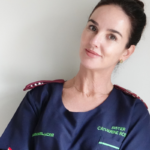
From witnessing a lot of trauma in my work to empowering parents
I want to take you on a journey that led me to become a full-time CPR and first aid instructor and proud business owner of Survival CPR. This story is about passion, empowerment, and making a real difference in the lives of people like you. A Trauma-Fueled Calling: Having spent
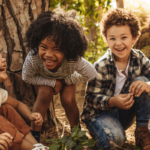
The Role of the Microbiome in Children
As we bask in the warmth of spring and witness the beauty of nature’s renewal, let’s delve into a topic just as fascinating and vital for our little ones’ well-being – the microbiome. This month, we explore the incredible world of microorganisms that inhabit our children’s bodies and the profound

World Breastfeeding Week
World Breastfeeding Week: Celebrating the Benefits for South African Families As we embrace the month of August, we joyfully celebrate the significance of family and the well-being of our precious little ones. In this blog post, we highlight the importance of World Breastfeeding Week, a cherished event that takes place
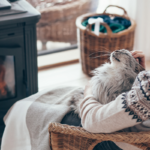
Winter Safety Guide
Winter’s arrival brings with it a desire to snuggle up and stay warm in the comfort of our homes. Fireplaces, gas and electrical blankets, heaters, and hot water bottles become our trusted companions during these chilly months. However, it’s crucial to prioritize safety to prevent potential accidents or hazards. In
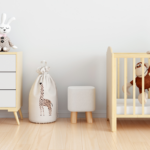
Sudden Infant Death Syndrome (SIDS)
Sudden Infant Death Syndrome, or SIDS, is a heartbreaking tragedy that affects thousands of families each year. As a parent, the thought of losing your child to SIDS can be overwhelming and scary. But there are steps you can take to reduce the risk of SIDS and be prepared for
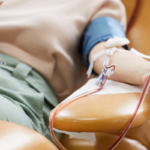
World Blood Donor Day 2023: “Give blood and keep the World beating”
Did you know that blood donation is one of the most selfless and impactful things you can do for your community? It’s true! And in South Africa, the need for blood donors is always high. That’s why today, I want to share with you some of the many reasons why
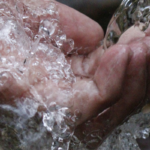
First Aid for Burns – a must read for every parent
Sister Catherine Rodwell sheds light on the right way to handle burns, be it in children or adults. It’s crucial to be aware of the proper procedure to not worsen the burn’s impact. From 6-12 May, National Burns Awareness Week is being observed. In continuation of our conversation with “Mommy

A mother recounts her traumatic experience
We are very grateful for this mommy who wanted to share her traumatic story with us, so that other parents can learn how quickly accidents can happen. Please note that photo’s can be triggering. We are very grateful for this mommy who wanted to share her traumatic story with us,


